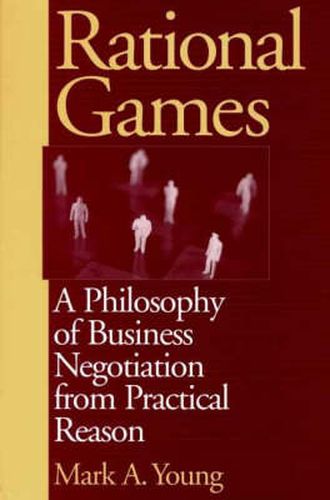Readings Newsletter
Become a Readings Member to make your shopping experience even easier.
Sign in or sign up for free!
You’re not far away from qualifying for FREE standard shipping within Australia
You’ve qualified for FREE standard shipping within Australia
The cart is loading…






Offers pragmatic and useful answers to the question: why do people settle for less in a business negotiation when they could, and should, get more? Why do people in a business negotiation settle for less than each of them could and should receive? Two rational players face off in an economic game. Each pursues interests as conventional theory dictates, but all too often, the result is suboptimal. Why do they fail to capture what Dr. Young calls the cooperative surplus ? Dr. Young proposes that the root of the problem lies in the philosophical assumptions underlying decision and game theory. The common understanding of economic rationality is fundamentally flawed, he says. It assumes that rational players are always self-interested and that they will make decisions on the basis of consequences. Arguing that no theory of economic rationality developed from this foundation can lead to the desired prescriptive results, Dr. Young maintains that a successful prescriptive theory of rationality must start from a different premise: the notion of actors as autonomous agents who act over and above their inclinations to express their identity. Dr. Young advances his own notion of economic rationality, then seeks to establish rules by which rational economic players can jointly create a common base for business negotiation. The results of bargaining will then be in equilibrium, and a solution optimal to both sides can be reached. Already praised by philosophers in Europe for its innovative vision and practicality, this book is a must for business executives and attorneys engaged in business negotiations, as well as for their colleagues with similar interests in the academic community.
$9.00 standard shipping within Australia
FREE standard shipping within Australia for orders over $100.00
Express & International shipping calculated at checkout
Offers pragmatic and useful answers to the question: why do people settle for less in a business negotiation when they could, and should, get more? Why do people in a business negotiation settle for less than each of them could and should receive? Two rational players face off in an economic game. Each pursues interests as conventional theory dictates, but all too often, the result is suboptimal. Why do they fail to capture what Dr. Young calls the cooperative surplus ? Dr. Young proposes that the root of the problem lies in the philosophical assumptions underlying decision and game theory. The common understanding of economic rationality is fundamentally flawed, he says. It assumes that rational players are always self-interested and that they will make decisions on the basis of consequences. Arguing that no theory of economic rationality developed from this foundation can lead to the desired prescriptive results, Dr. Young maintains that a successful prescriptive theory of rationality must start from a different premise: the notion of actors as autonomous agents who act over and above their inclinations to express their identity. Dr. Young advances his own notion of economic rationality, then seeks to establish rules by which rational economic players can jointly create a common base for business negotiation. The results of bargaining will then be in equilibrium, and a solution optimal to both sides can be reached. Already praised by philosophers in Europe for its innovative vision and practicality, this book is a must for business executives and attorneys engaged in business negotiations, as well as for their colleagues with similar interests in the academic community.